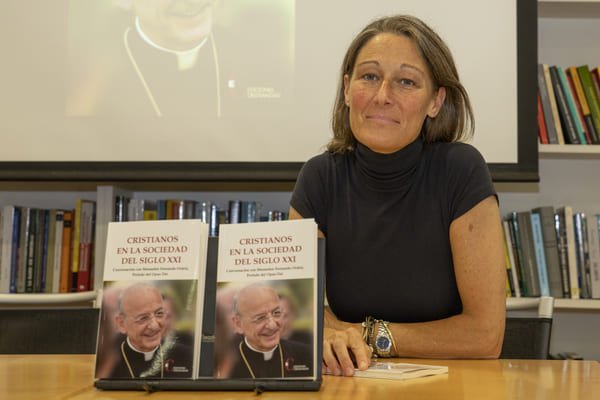How did the idea for this book arise?
Since becoming a mother I look at the world from a different point of view. Not my own, but thinking of the future that I will leave to my children. So these are questions that trouble me personally. It is a world very much in a hurry, changing rapidly, aggressive. A world where sickness is hidden, where it is seen as a great burden, where we find a lot of addiction and depression... These are questions that I raise for myself and that I don’t have a solution for.
Why did you decide to ask the Prelate of Opus Dei these questions?
I saw him as someone who would have something valuable to say. He is both a physicist and a theologian. He is an intelligent and calm person with a broad vision of the world. Besides, through what I had heard and read, I knew he was a person who, while taking into account all the negative realities in the world, has a deeply hopeful message.
My work as consultant for Ediciones Cristiandad was also a factor. One of my goals is to offer a clear answer to the question of God’s place in today’s world, the different ways of praying, the lack of faith or even the contempt for it, the different types of spirituality, etc.
For me this interview was a good opportunity to offer a book with solid spiritual content, easy to read and specific, something that many people are looking for.
Tell us how you drew up the 70 questions.
Some I already had in mind, or better, in my heart, for a long time now. But for others, I asked other people for advice. I’m not a journalist and I didn’t want the book to end up being long and boring, so I asked friends from several professions, some of them journalists, for help. So you could say the questionnaire was a team effort.
A book based on an interview depends upon the person asking the questions but above all on the person answering them. Are you happy with the results?
Yes, definitely. I work slowly and need a calm atmosphere, so I have taken my time. It is not a book of rapid answers but of deep ones. It is definitely a book that requires more than one reading. Every word in it is significant.
But I have also tried to ensure that it is not so heavy that it ends up making the interview a dense and boring book of theology or spirituality
Some of the questions raise aspects of Opus Dei that are less well understood by many people.
I wanted the Prelate to answer some questions that are frequently raised by public opinion and even by people close to Opus Dei. And besides, I had a personal interest. I was interested in knowing the Prelate’s vision regarding some aspects of the “evolution” of Opus Dei.
If you had to sum up the book in a single sentence…
I would choose this one: “We are not alone in this battle.” There for me lies the heart of the book: the firm hope that comes from not relying on our own strength alone. I also like his call to personal responsibility when he says, “we are all responsible, all protagonists.” At another moment, he sums up this sentence in another way: “Without ignoring the problems present in every epoch, we should never forget that God is the Lord of History.”
► Download (in Spanish) the table of contents, foreword and part of the first chapter
